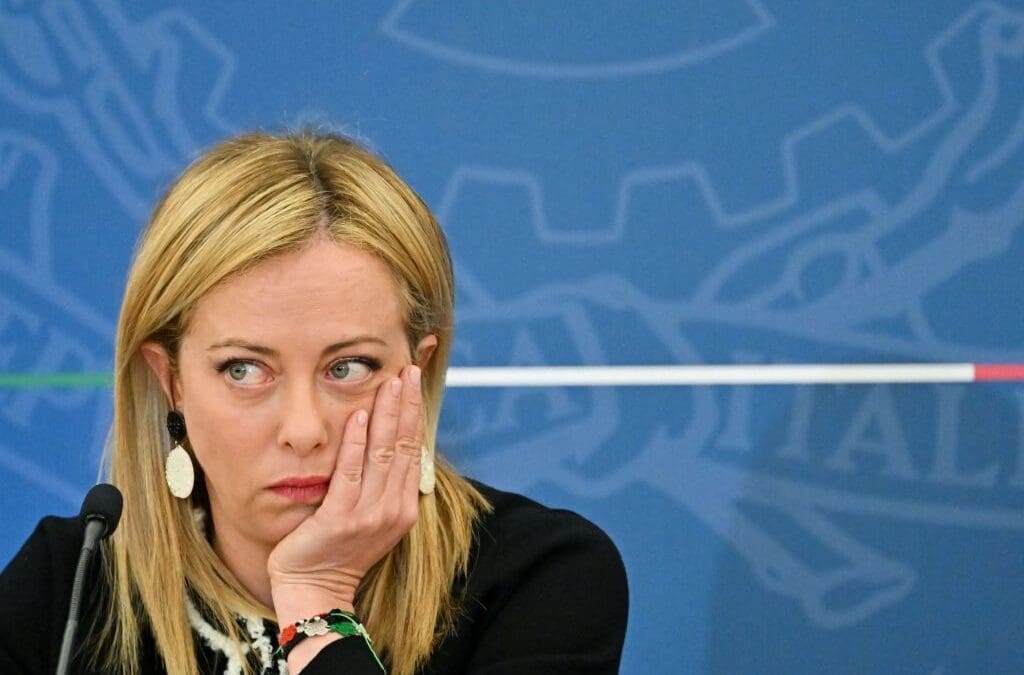
MAGA is Powered by Hatred
February 24, 2025
Trumpism Is Not Inevitable
February 24, 2025
Not much more than two years since her far-right coalition came to power, Meloni’s government is Italy’s longest lasting in a decade. To the Left’s horror, she initially appeared to be the effective strongwoman the reactionary right had been waiting for. The economy seemed steady, backed up by the European Union’s (EU) post-pandemic spending, and she managed to sanitize her xenophobic border regime, selling it as a “commonsense” policy to an EU establishment desperate for stability.
Key to her strategy has been the Mattei Plan, a geopolitical maneuver to secure new energy sources from African states, enrich Italian capital, and shut down migration routes. Particularly in the context of years of energy price fluctuations owing to the war in Ukraine, the plan seemed to tick all the boxes. Whereas previous governments headed by right-wingers had sometimes tarnished Italy’s appearance on a global stage (through Matteo Salvini’s boorish browbeating for instance), Meloni has instead positioned herself as a more reasonable partner for the establishment, consolidating bonds with Europe’s conservatives while forging diplomatic ties with leaders of many African states.
The plan invokes the name of Enrico Mattei — the anti-colonial oil executive who struck deals with newly independent states like Algeria in the 1960s, before he was assassinated by the Mafia and the Anglo-American oil cartel. But Meloni’s plan bears more resemblance to the murky dealmaking of figures like Bettino Craxi and Silvio Berlusconi, whose careers are remembered more for scandal than statesmanship.
Where Mattei sought partnerships rooted in postcolonial solidarity, Meloni’s approach is built on backroom pacts with bloody dictators to police migration on Europe’s behalf. After racist pogroms in Tunisia forced thousands of black people to flee the North African state, Italy helped negotiate a billion-dollar International Monetary Fund deal in exchange for violent border control at sea. Ursula von der Leyen’s visit to the southern Italian island of Lampedusa last year demonstrated the bloc’s tacit approval, while smiling photo ops with first Rishi Sunak and then subsequent British premier Keir Starmer seemed to show that a love of border control can cut across the political divide.
Now that strategy is unraveling, and Meloni’s government is reeling from a series of interlocking scandals — from enabling war criminals to spying on journalists and activists — while the economy plunges.
Supporting the Libyan unity government consequently also means supporting its armed wing, the Special Deterrent Forces (SDF), a group reported to have engaged in everything from torture and human trafficking to violently suppressing a comic conference. Among the SDF’s leaders is Osama Al-Masri, a man who is personally accused of a long list of horrifying acts of violence and extortion, but who has nonetheless been at large.
Much used to jet-setting and business trips, on January 6, Al-Masri flew from Tripoli to London. After stops in Germany and Brussels, he arrived in Turin to attend a Juventus football match. On January 18, however, following a routine border check, the International Criminal Court (ICC) issued an arrest warrant for Al-Masri, charging him with war crimes, murder, enslavement, and crimes against humanity. Italian police arrested him the next day — but the victory was short-lived. Just three days later, the government released him apparently on a technicality, claiming that Interpol had failed to notify the Ministry of Justice. Not only was Al-Masri freed, but the Italian government arranged a secret service jet to fly him back to Tripoli, where he was greeted by his supporters as a hero.
The scandal set off a political firestorm. Interior Minister Matteo Piantedosi tried to pass it off as a routine deportation of a dangerous illegal immigrant, but criminal charges have been filed against Meloni and Justice Minister Carlo Nordio for their role in the release, and the opposition parties have called for a vote of no-confidence in the latter.
Parliament was unofficially suspended for several days as the European Union condemned Italy for violating the ICC warrant. Meanwhile, activists who have survived Libya’s detention centers stepped forward with harrowing testimony, directly implicating Meloni’s administration in aiding a known torturer. The court in The Hague has also opened an investigation into potential criminal consequences of the Italian government’s actions. Parroting Trump, Meloni’s party lashed out at the “red judges” in Italy and The Hague out to get her.
The first to speak out was Husam El Gomati, a Libyan activist in Sweden who has long criticized Italy’s role in Libya and the current Libyan government. Soon after. Francesco Cancellato — the editor of Fanpage.it who came to prominence last year after an investigation into fascists in the youth wing of Meloni’s own party— identified himself as having been spied on too. Next up were members of the NGO rescue ship Mediterranea, some of the strongest critics of Italy’s Libyan policies, who have even been shot at by the (Italian-funded) Libyan Coast Guard while conducting migrant rescue operations. Luca Casarini, a member of Mediterranea and a long-standing activist in Italy’s social movements, discovered that his phone was first infiltrated at the beginning of 2024. David Yambio also came forward — the same Sudanese activist and refugee who has personally accused Al-Masri of torture. It has been revealed that the ship’s chaplain has also been spied on for over a year, with questions raised about whether the Pope has been saved from the government’s snooping. Mediterranea has officially reported notice of a crime to the public prosecutors, as has the journalists’ trade union, defending Cancellato.
Paragon announced that it has severed the contract with Italy because of a violation in the terms of service — meaning that Italy used the software illegally to spy on activists and journalists. The Italian equivalent of the CIA, while denying that they spied on activists and journalists, actually admitted to using the spyware. Luca Ciriani, who is Fratelli d’Italia leader in the Senate, went even further, not only claiming that the contract is still active and that the government had not spied on journalists but also threatening to take legal action against anyone who says so — which, in terms of democratic freedoms, is arguably just as bad.
Members of the government — notably deputy premier Salvini — are scrambling to construct a different narrative, shifting the blame onto a power struggle within the Italian secret services, but institutions ranging from the courts to the prison police may be just as involved. Last week, Meloni refused to be questioned in parliament on the matter, citing the state secrets act — even as Nordio broke ranks, providing his own replies in an attempt to exonerate his Ministry of Justice from the accusations.
While Meloni’s European partners may be happy to support Italy’s position as a Mediterranean border guard, this is meant to proceed without any complicity in war crimes coming to the fore. European Commission chief Ursula von der Leyen is attempting to maintain a difficult pact between liberals and the right wing in the new European parliament in the face of Trump’s brazen disrespect for international law and diplomacy. Italy’s support for Trump in his attacks on the International Criminal Court now looks embarrassing and self-serving, given that Meloni’s own government is being investigated.
Furthermore, the internal crisis strikes at the heart of Meloni’s core policy precisely at the moment when the Italian economy is demonstrating itself to be less robust than it first seemed. After an initial period of growing GDP, the last six months have registered almost zero growth, with 2024 closing at 0.5 percent — and official government projections for the coming year are little better (0.9 percent). Much-vaunted statistics on falling unemployment are showing themselves to have been massaged, covering over a reality of poverty and precarity. If employment has slightly increased to 62 percent, with some small increments in the average salary, this has not been enough to fend off the effects of inflation: real wages have dropped by 5 percent on average since Meloni’s government came to power.
Chronic mismanagement in the public administration has stymied hopes that European post-COVID-19 stimulus funds could kick-start consumption. And despite the long-term goals of facilitating gas prices through the geopolitical maneuvers described above, energy prices are actually up, with a knock-on effect on already suffering Italian industry, especially the auto industry. Most importantly, depressed real wages and shaky manufacturing are the worst circumstances from which to begin a trade war with the United States, when internal consumption may well become the key to creating demand and incentivizing internal investment.
Meloni has tried to position herself as a “bridge” between the European establishment and Trump’s far-right radicalism. Yet this, too, opens a new array of problems, not only over the war in Ukraine but also for the upcoming elections in Albania — another key player in Meloni’s geopolitical gambit, but where Trump’s circle appears to be supporting the rival candidate. Either way, Italy’s ability to move independently of Europe during a trade war with the United States is extremely limited: the options are to lead Europe or be left behind. How far the European capitalist class will be willing to turn a blind eye to facilitating war criminals and spying on refugees and civil society groups remains to be seen. If Meloni’s government can’t even guarantee economic growth, it may be that a chink is appearing in the post-fascists’ armor.
Great Job Richard Braude & the Team @ Jacobin Source link for sharing this story.






